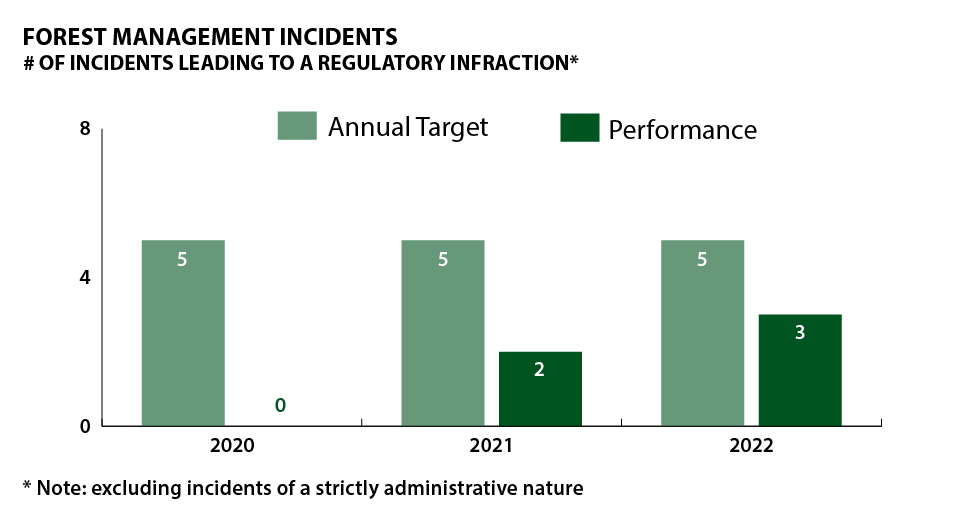At Resolute Forest Products, regulatory compliance is non-negotiable, and we pride ourselves on the ability to set and exceed environmental standards that make us an industry leader. We prioritize developing sustainable forest management plans for our operating woodlands in order to address a variety of important issues, such as species at risk and public involvement. For full transparency, we report information on sanctions and fines levied against the company to our customers and stakeholders.
Regulatory Compliance
In the Quebec and Ontario woodlands where we operate, each provincial government has its own system for monitoring compliance with forestry and environmental laws and regulations. Compliance inspectors visit our sites noting any regulatory non-compliance. In Ontario, a combination of government and forest industry inspectors identifies instances of non-compliance and, where possible, companies are given an opportunity to rectify the situation.
The government imposes administrative penalties and fines when an issue cannot be addressed, generally within a three-year period. In Quebec, the government carries out compliance inspections without involving the company in the process. Non-compliance charges can be filed several years after an incident occurs, and legal proceedings can take an additional two years.1 In many cases, non-compliance situations that have been corrected will still incur a fine.
Although we have a long history of keeping our annual non-compliance rates below the industry average, Resolute nevertheless ensures that regulatory non-compliance incidents, and the associated fines, are closely monitored. That is why in 2009 Resolute implemented a policy of acountability for forestry non-compliance and has been working steadily to achieve the annual targets we set.
By setting annual targets and reporting publicly on our results, we have successfully lowered Resolute's non-compliance rates and created a culture of accountability for regulatory non-compliances.
Our Commitment to Regulatory Compliance and Reporting
As part of our public commitments, we began publicly reporting our compliance with forest management regulations in 2014, setting annual targets ever since. For 2022, our objective was a maximum of five forest management incidents leading to a regulatory infraction in Canada, with a long-term goal of zero infractions.2 We received three notices of infraction for forest management incidents recorded in Ontario between 2018 and 2021, for a total of $16,000 in fines. For 2023, we remain committed to recording no more than five forest management incidents leading to a regulatory infraction in Canada.2

Information on regulatory compliance related to mill environmental performance is available on the Environmental Management page.
Tenure System in Quebec
In April 2013, regulatory tenure changes were implemented in Quebec, which resulted in about 30% of Resolute's timber supply being removed from current company allocations and sold through public auction (link in French only). As part of these changes, responsibility for forest management planning and silviculture was taken over by the provincial government. Industry retains a role in the operational planning of harvesting activities and continues to hold forest management certificates.
The implementation of this system increased the cost of harvesting timber and has also affected supply. Resolute will continue to closely monitor and assess the effects of forest-related regulatory developments in Quebec. We will continue to position the company competitively in the timber auction market and will explore opportunities that could result from these regulatory shifts.
Ontario Forestry System
In Ontario, there are different forest tenure models. Resolute directly manages forests under one of these models, the Sustainable Forest License (SFL), which is granted for a period of up to 20 years and subject to a five-year review. Resolute is also a board member and shareholder of two entities it does not manage directly – an SFL and a forest management corporation – both of which provide the company fiber from Crown Land.
1 In the Province of Quebec, proceedings with respect to offences committed under the “Regulation respecting standards of forest management for forests in the domain of the State” are instituted by the Director of Criminal and Penal Prosecutions under the Code of Penal Procedure.
2 Excludes those of a strictly administrative nature. Disclosed regulatory infractions as they would be published on the provincial ministry website only include woodlands operations directly managed by Resolute.